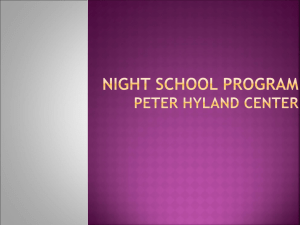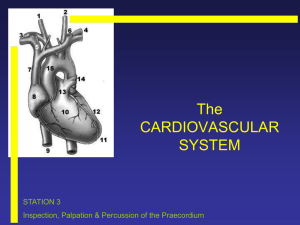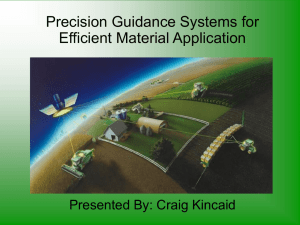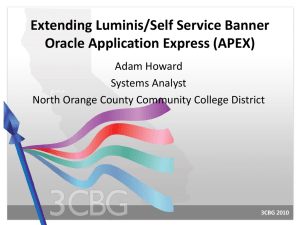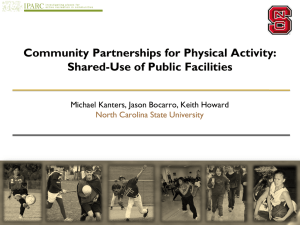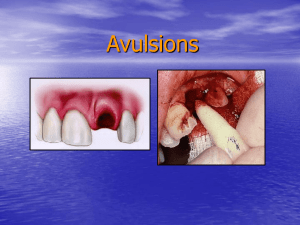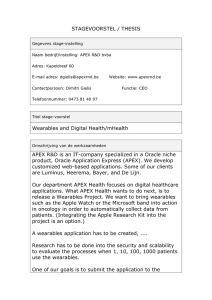02_Corlett_APEX_FLS2012
advertisement
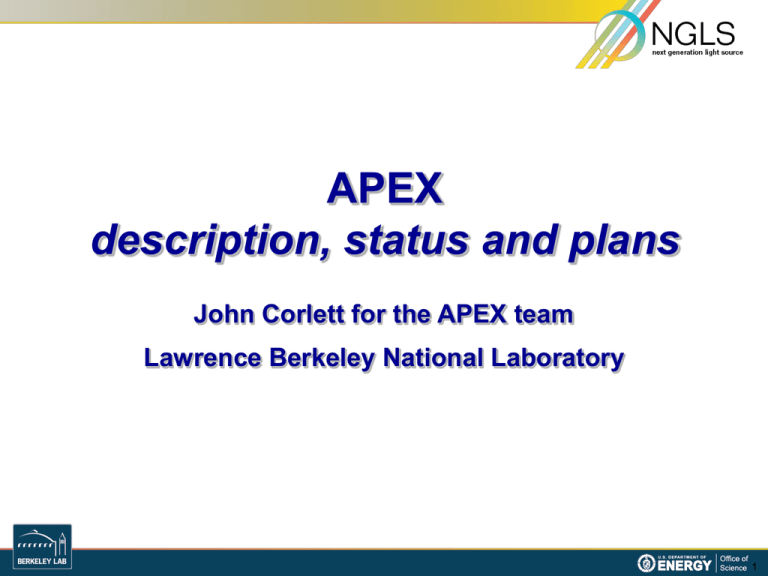
APEX description, status and plans John Corlett for the APEX team Lawrence Berkeley National Laboratory 1 Motivation Coherent X-rays with high repetition rate, unprecedented average brightness, and ultrafast pulses Tomorrow’s x-ray laser sources ≲millijoule ~ microseconds Intense pulses at high rep rate ~ attoseconds to femtoseconds Approach High average power electron beam distributed to an array of FELs from high reprate injector and CW SCRF linac Beam spreader High-brightness, CW superconducting linac, high rep-rate gun laser heater, bunch compressor and injector Array of independent FELs X-ray beamlines and endstations Injector design goals – APEX gun • Repetition rate 1 MHz • Charge per bunch from ~10 pC to ~1 nC • Emittance <10-6 mm-mrad (normalized) • Electric field at the cathode ≥~10 MV/m (space charge emission limit) • Beam energy at the gun exit ≥~500 keV (space charge control) • Bunch length ~100 fs to ~10 ps for handling space charge effects, and for allowing different modes of operation • Compatible with magnetic field control within the gun (emittance exchange and compensation) • 10-11 Torr vacuum capability (cathode lifetime) • Accommodates a variety of cathode materials • High reliability for user operations The gun is the most challenging component LBNL approach uses a CW VHF cavity APEX gun VHF cavity operates in CW mode • Low power density on cavity walls • High conductance vacuum slots • High gradient at cathode Frequency 187 MHz Operation mode CW Gap voltage 750 kV Field at the cathode 19 MV/m Q0 30887 Shunt impedance 6.5 MW RF Power 90 kW Stored energy 2.3 J Peak surface field 24 MV/m Peak wall power density 25 W/cm2 Accelerating gap 4 cm Diameter/Length 70/35 cm Operating pressure < 10-11 Torr Buncher Injector design and beam dynamics – multiobjective genetic optimization 300 pC RMS bunch length (m) Gun Projected normalized emittance (m-rad, 100%) APEX stages Phase I: Beam characterization at gun energy (750 keV) Phase-II: Beam characterization at 15–30 MeV •6-D brightness measurements Phase 0: Gun and photocathod e tests Diagnostics systems in collaboration with Cornell CLASSSE Accelerating cavities in collaboration with ANL AWA • Planning for final installation in 2013 APEX stages – 0, I Phase 0 scope: • Demonstration of the RF performance at full repetition rate. • Vacuum performance demonstration. • Dark current characterization. • High QE cathode physics (QE and lifetime measurements) Under commissioning Phase 0 Phase I scope: (Phase 0 + extended diagnostics) • High QE cathode physics (Intrinsic emittance measurements) • Diagnostics systems tests. • Low energy beam characterization Planned operation in fall 2012 Phase I 8 APEX stages – II Phase II scope: • Demonstration of the brightness performance at ~ 30 MeV at low repetition rate* (*Shielding limited) APEX Phase II layout Planning for operation in late 2013 9 APEX Description Status & Plans (J. Corlett) Gun cold-test and installation Successful low power RF test Tuning mechanism principle tested 1.2 10-9 Torr achieved with 1 (out of 20) NEG pump and no bake 10 APEX gun: high-brightness MHz electron source • APEX cavity is successfully RF conditioned APEX in the Beam Test Facility APEX Activity and Plans Yb fiber photocathode drive laser F. Sannibale • 1 MHz reprate Yb fiber laser • LLNL/UCB/LBNL collaboration Photocathode materials R&D K2CsSb: 6% QE at 532 nm 0.36 microns / mm rms en >> 1 week lifetime 4 x 10 3.5 100 3 200 2.5 300 400 2 500 1.5 600 700 1 800 0.5 900 1000 High QE Good lifetime at 10-9 mBar 200 400 600 800 1000 0 Low transverse momentum APEX Description Status & Plans (J. Corlett) Photocathodes PEA Semiconductor: Cesium Telluride Cs2Te (In collaboration with INFN-LASA) - <~ps pulse capability - relatively robust and un-reactive (operates at ~ 10-9 Torr) - successfully tested in NC RF and SRF guns - high QE > 1% - photo-emits in the UV ~250 nm (3rd or 4th harm. conversion from IR) - for 1 MHz reprate, 1 nC, ~ 10 W 1060nm required FLASH INFN-LASA Cathodes successfully developed at INFN/LASA and delivered to LBNL PEA Semiconductor: Alkali Antimonides CsK2Sb, (developed at LBNL) - <~ps pulse capability - reactive; requires ~ 10-10 Torr pressure - high QE > 1% - requires green/blue light (eg. 2nd harm. Nd:YVO4 = 532nm) - for nC, 1 MHz reprate, ~ 1 W of IR required Cathodes under development at LBNL (H. Padmore’s group) Promising lifetime and intrinsic emittance results (Cornell and LBNL) Transfer chamber to VHF gun in preparation Collaboration with BNL for diamond amplifier testing 15 Status The ofAPEX the APEX Project Project at LBNL F.(J.Sannibale Corlett) Cathode mount & vacuum load-lock Adapted version of the INFN/PITZ/DESY load-lock system Modified version of the FLASH plug for reduced field emission. Not tested yet! Flexibility for testing different photocathode materials 16 APEX APEX Activity Description and Plans Status & Plans (J. Corlett) VHF amplifier • The 120 kW CW 187 MHz RF amplifier required to operate the VHF gun has been manufactured by ETM Electromatic • Acceptance test completed at LBNL, fully operational 17 APEX APEX Activity Description and Plans Status & Plans (J. Corlett) APEX phase-II RF distribution Single RF source: 1.3 GHz, 25 MW pulsed at 10 Hz with 10 ms pulse RF Distribution System Buncher cavity: LBNL design LINAC: 3 accel. sections. Deflecting cavity: Modified Cornell Type AWA/ANL type 18 APEX APEX Activity Description and Plans Status & Plans (J. Corlett) Coaxial feed multipacting cure Alternative approach Minimal length, NTi coated and water cooled. The solenoid cure worked! 19 APEX APEX Activity Description and Plans Status & Plans (J. Corlett) RF conditioning completed Gun RF conditioning started on November 7, 2011 CW Pulsed At Dec. 15, 2011 integrated < 120 hours of conditioning. December 15: CW mode at nominal power ran for 12,5 hours without faults Results reconfirmed the day after (> 24 hours no fault) Power stability ~2x10-3 20 APEX Description Status & Plans (J. Corlett) Dark current Measurements performed in CW mode on a coaxial Faraday cup right downstream the beam pipe exit Dark current follows Fowler-Nordheim dependence on the E field At the nominal field (19.5 MV/m) the present value is ~ 8 mA Expected to decrease when the beamline is installed and vacuum bake completed 21 APEX Description Status & Plans (J. Corlett) Vacuum performance Measurements performed with a Dycor 2000 RGA system 1 NEG pump out of 20 activated, 1 ion pump, 2 turbo pumps; no bake H2 He C N O HO HO2 C N2 O2 Ar CO2 22 APEX Description Status & Plans (J. Corlett) Thermal effects on frequency We have two “regimes”: cold cavity in the first ~ 30 min where the copper is going to temperature; warm when the copper temperature stabilizes TS2 TS1 TC2 TC 23 Summary – APEX R&D program • The APEX injector is being commissioned • Designed for high-brightness electron beam at MHz repetition rate • VHF cavity • Flexibility in photocathode materials • Progress: • VHF cavity is RF conditioned • Initial characterization of dark current and tuning • Cathodes under development • Plans: • Photoemission experiments to start soon • Phases I and II add diagnostics, bunching, acceleration • Plan to complete construction and begin final beam characterization in 2013 A team effort F. Sannibale, B. Bailey, K. Baptiste, J. Byrd, M. Chin, D. Colomb, J. Corlett, C. Cork, S. De Santis, S. Dimaggio, L. Doolittle, J. Doyle, J. Feng, D. Filippetto, G. Huang, H. Huang, T. Kramasz, S. Kwiatkowski, R. Lellinger, W. E. Norum, H. Padmore, C. Papadopoulos, G. Penn, C. Pogue, G. Portmann, J. Qiang, D. Garcia Quintas, J. Staples, T. Vecchione, M. Venturini, M. Vinco, W. Wan, R. Wells, M. Zolotorev, F. Zucca, … 25
